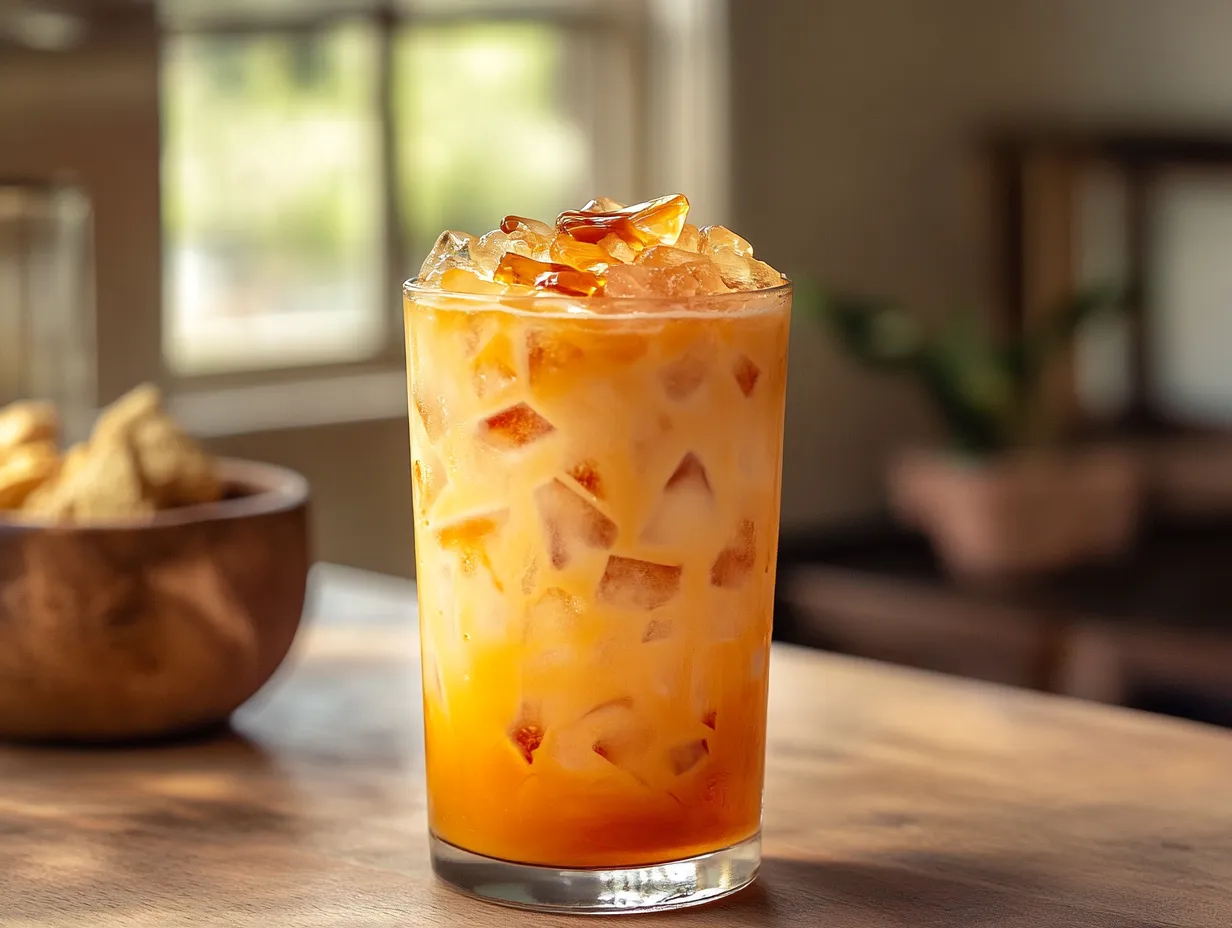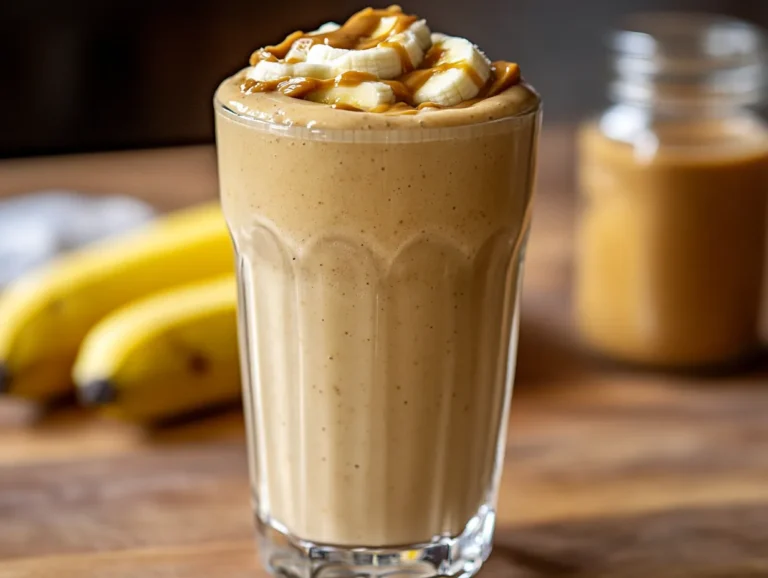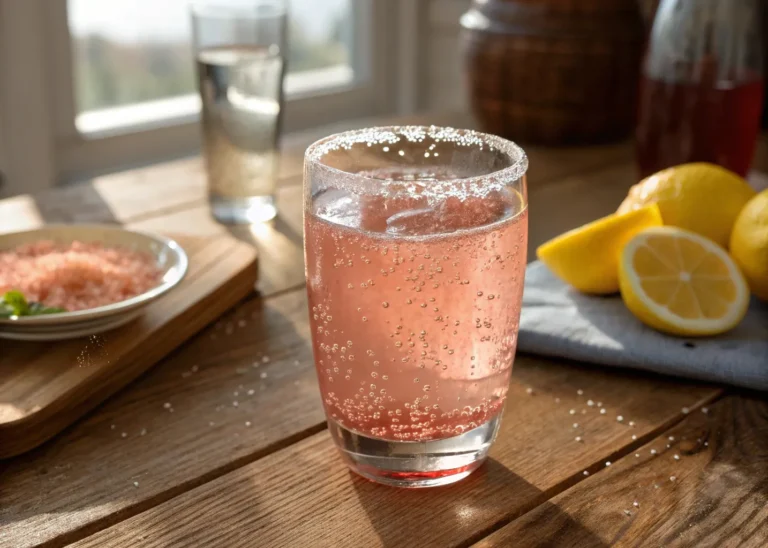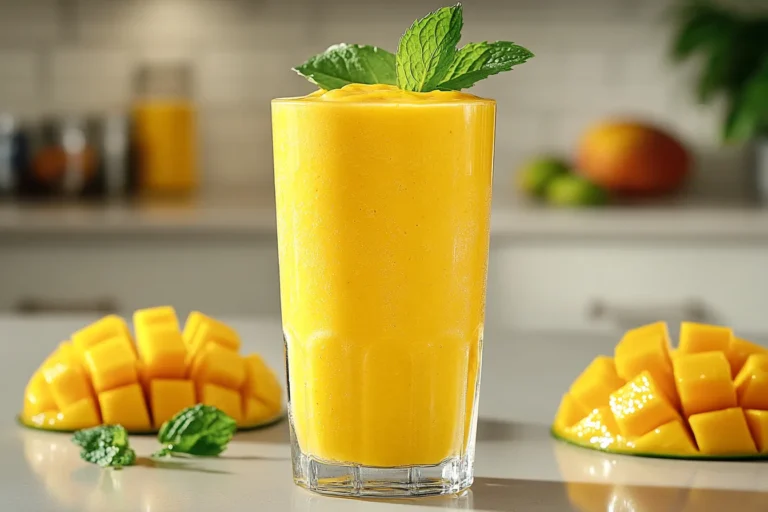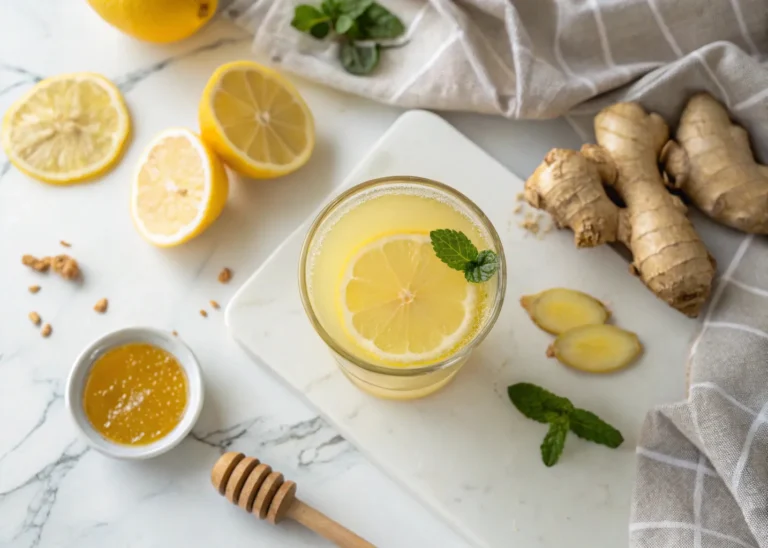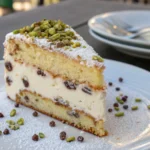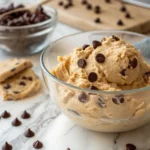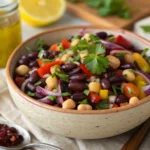Let me tell you something straight up — Thai iced tea is one of those drinks that hits different. It’s creamy, sweet (but not too sweet), and loaded with bold flavor that feels like an instant escape to a Thai street market. If you’ve only ever had it at a restaurant, you’re in for a serious upgrade.
This recipe is personal. Like… really personal. I’ve spent way too much money on Thai iced tea over the years and I finally said, “Okay, we’re making this at home — better, cheaper, and with ingredients I actually trust.” And guess what? You can absolutely do the same. No fancy machines. No weird ingredients. Just real flavor.
And no — we’re not using any questionable or overly processed ingredients. I keep things real, clean, and true to what you actually want to drink.
In this guide, I’ll show you exactly how to make the best Thai iced tea at home — from what kind of tea to buy, to nailing that creamy swirl and signature color. Oh, and we’ll cover some cool variations too — vegan, boba-style, even hot Thai tea lattes.
You’re going to want to save this one.
What Is Thai Iced Tea?
The Origins: How Thai Iced Tea Became a Global Favorite
Thai iced tea — or Cha Yen in Thai — started as a local street drink in Thailand and quickly became a cultural icon. Vendors began brewing strong black tea, sweetening it with sugar and condensed milk, and serving it over crushed ice to beat the tropical heat. That beautiful orange drink you now see at Thai restaurants all over the world? That’s it.
What makes Thai iced tea really stand out is the combination of flavors. It’s strong, creamy, slightly spiced, and refreshingly cold. That balance is key — and honestly, addictive.
What Makes Thai Iced Tea Unique?
It’s not just the color (although that bright orange is pretty eye-catching). Thai iced tea has a specific flavor profile thanks to the black tea base (often mixed with tamarind, star anise, or cardamom), sweetened condensed milk, and sometimes evaporated milk for that silky finish.
And unlike chai or boba milk teas, it doesn’t rely on a heavy spice blend or chewy tapioca — it’s simpler and cleaner in taste, but still bold and comforting.
Whether you’re here because you love Thai food, you’re cutting back on $6 takeout drinks, or you just want a new kitchen project, this is the drink that’ll win you over.
Thai Iced Tea Ingredients You’ll Need
Alright — let’s talk ingredients. If you’ve ever tried to recreate Thai iced tea at home and it just didn’t hit the same, chances are something was off in the base. Getting that authentic taste starts with knowing exactly what to use (and what not to).
This part is key, so I’m walking you through the basics, the swaps, and even where to buy the good stuff.
The Key Ingredients (And Why They Matter)
Here’s what goes into a real-deal Thai iced tea — the kind that actually tastes like the one from your favorite Thai spot:
| Ingredient | What It Does |
|---|---|
| Thai Tea Mix or Loose Leaf Thai Tea | This is the soul of the drink. It’s black tea often flavored with star anise, tamarind, and vanilla. |
| Sweetened Condensed Milk | Adds richness and sweetness. It’s thick, creamy, and essential for that dessert-like finish. |
| Evaporated Milk or Half & Half | Used for the final swirl. Lighter than condensed milk, but gives that signature cream top. |
| Sugar (optional) | If you want it extra sweet — but the condensed milk usually does the job. |
| Ice | Crushed is best — it chills quickly and gives that café-style look. |
| Optional Spices | A tiny pinch of cardamom or star anise if you want to deepen the flavor. |
Heads up: You don’t need food coloring if you’re okay with a more natural color. But most pre-made Thai tea mixes include it by default.
Dairy vs. Dairy-Free Options (Without Losing the Taste)
Trying to keep it dairy-free or vegan? Totally doable — and still delicious.
| Dairy Ingredient | Dairy-Free Alternative |
|---|---|
| Sweetened Condensed Milk | Sweetened coconut condensed milk or oat-based version |
| Evaporated Milk / Half & Half | Barista oat milk, coconut cream, or soy creamer |
I’ve tested this. Coconut condensed milk works great, especially for that creamy-sweet balance Thai iced tea is known for.
Just make sure whatever you use is full-fat and rich.
Where to Buy Thai Tea Mix or Loose Leaf
Now for the million-dollar question: Where do I get this stuff?
You have two solid options:
- Pre-mixed Thai tea bags or powder – These are sold at most Asian grocery stores or online.
- Popular brands: Pantai, Number One Brand, ChaTraMue (OG brand from Thailand)
- They usually come with orange color already included.
- Loose leaf tea – If you’re going for a more natural version without food dye.
- Look for strong black tea (Ceylon or Assam) and add a pinch of star anise or tamarind for that Thai twist.
Pro tip: If you’re not near an Asian market, Amazon and specialty online stores usually have all the good brands — just check the ingredient list to avoid artificial extras if that matters to you.
How to Make Thai Iced Tea at Home (Step-by-Step)
Let’s keep it real — if you’ve been intimidated by making Thai iced tea from scratch, don’t be. Once you’ve got the right ingredients, the process is shockingly simple.
The key is balance: strong tea + creamy finish + a little chill time.
Brew the Tea Right (No Bitterness!)
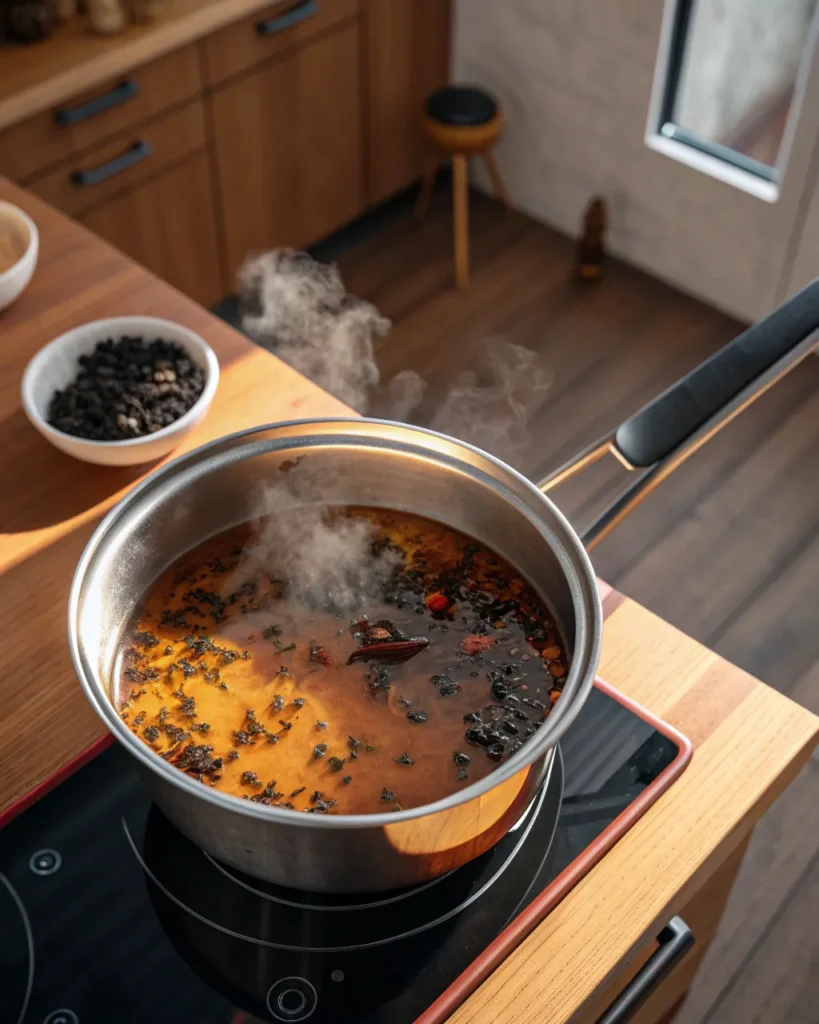
This is the step where most homemade Thai teas go wrong. If you over-steep or use boiling water carelessly, your tea will end up bitter or too tannic. Not good.
Here’s how to nail it every time:
Ingredients:
- 4 cups water
- 4 tbsp Thai tea mix (or loose leaf + optional spices)
- Optional: Add 2 to 3 tablespoons of sugar if you’re skipping sweetened condensed milk.
Instructions:
- Bring the water to a boil, then lower the heat to a gentle simmer. Stir in the Thai tea mix.
- Simmer for 3–5 minutes, then remove from heat. Let it steep for another 15 minutes off the heat.
- Strain using a fine-mesh strainer or cheesecloth. You’ll want a clean, deep amber liquid.
- Let it cool to room temp, then chill in the fridge for 30 minutes to 1 hour.
You can make this base in advance and keep it in the fridge for 3–4 days — total time-saver.
Sweeten & Cream It to Taste
Here’s where Thai iced tea goes from basic to beautiful. You’re going to mix the sweetened condensed milk into the tea for that rich flavor, then finish it off with a silky swirl of cream.
Assembly:
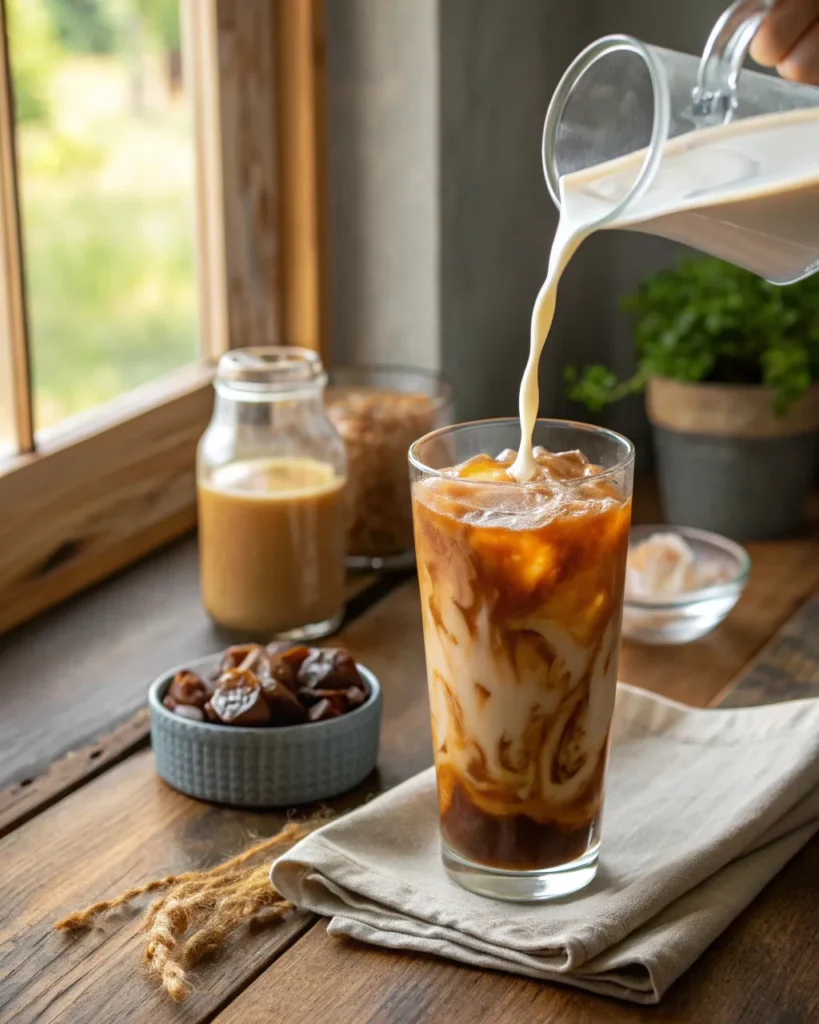
- Fill a tall glass all the way with crushed ice.
- Pour in the tea until the glass is about 3/4 full.
- Add 2–3 tablespoons of sweetened condensed milk (or coconut condensed milk for vegan).
- Top with 1–2 tablespoons of evaporated milk, half & half, or barista-style oat milk for that creamy layer.
- Give it a gentle stir — or leave it layered for that visual wow factor.
The sweetened condensed milk acts as both sugar and cream. Adjust to your taste. If you like it lighter, add more tea; if you like it richer, add more milk.
Iced Pouring Tips for That Signature Look
Want that café-style swirl with the dreamy cream floating through the amber tea? Here’s the trick:
- Use crushed ice or pellet ice — it slows down the mix and lets the cream float.
- Pour the tea first, then drizzle the milk slowly down the side of the glass.
- Stir with a long spoon just before sipping, or let your guest do it — part of the fun!
💡 Bonus Tip: Serve it in a clear glass. Thai iced tea is all about the visuals — that bright color and cloud-like swirl make it irresistible.
All About the Color — Why Is Thai Tea Orange?
Okay, let’s address the elephant in the room: that famous bright orange color. It’s one of the most recognizable parts of Thai iced tea — but also the part that raises the most eyebrows.
If you’ve been curious (or cautious) about where that color comes from and if it actually affects the taste, you’re not alone. Here’s everything you need to know — no fluff, no mystery.
The Role of Food Coloring
Traditionally, Thai iced tea wasn’t orange at all. In its purest form, it was just strong black tea served with milk and sugar. But once it hit Western restaurants, the look changed.
That bold orange shade? It’s mostly added food dye — commonly found in pre-packaged Thai tea mixes like ChaTraMue or Number One Brand.
Most of them use:
- FD&C Yellow No. 6
- FD&C Red No. 40
Those two together give it that deep orange glow.
And while it looks amazing — especially in layered drinks — some people (maybe you?) are looking for more natural options.
Natural Alternatives You Can Use
If you’re not into artificial dyes, good news — you can absolutely make a more natural version of Thai iced tea that’s just as flavorful.
Here’s how to do it:
| Alternative | Color Result | Flavor Impact |
|---|---|---|
| Annatto powder | Light orange | Mild, nutty |
| Turmeric (tiny pinch) | Yellow-orange hue | Slight earthiness |
| Paprika (very small amount) | Warm orange tint | Neutral when diluted |
| Carrot juice (splash) | Natural color booster | Slight sweetness |
Use sparingly — you’re going for aesthetic, not overpowering flavor.
Annatto and turmeric are your best bets for keeping the Thai tea “look” without going artificial.
Does the Color Affect the Taste?
Short answer? No.
The orange hue has nothing to do with flavor — it’s 100% visual.
The real taste of Thai iced tea comes from:
- The tea base (usually Ceylon or Assam)
- The spices (like star anise or cardamom)
- The sweetened condensed milk and how it’s balanced
So whether your tea is amber, light brown, or pale orange, it’ll still taste amazing if you use quality ingredients and follow the right ratios.
In fact, many Thai locals make and drink their tea without the added color at all.
💬 Real Talk: If you’re serving this at a party or want that restaurant-style look — use the pre-mix.
But if you care about keeping it clean, the natural route is just as good (and often prettier, honestly).
Prefer something lighter and herbal without added coloring? Try this lemon balm tea recipe for a naturally calming alternative.
Easy Thai Iced Tea Variations
So now that you’ve got the basic Thai iced tea recipe down — it’s time to customize it.
Whether you’re dairy-free, into boba, or just in the mood for something cozy and warm instead of iced, you’ve got options.
This isn’t just about changing things for dietary reasons — it’s about making Thai tea more you.
Vegan Thai Iced Tea
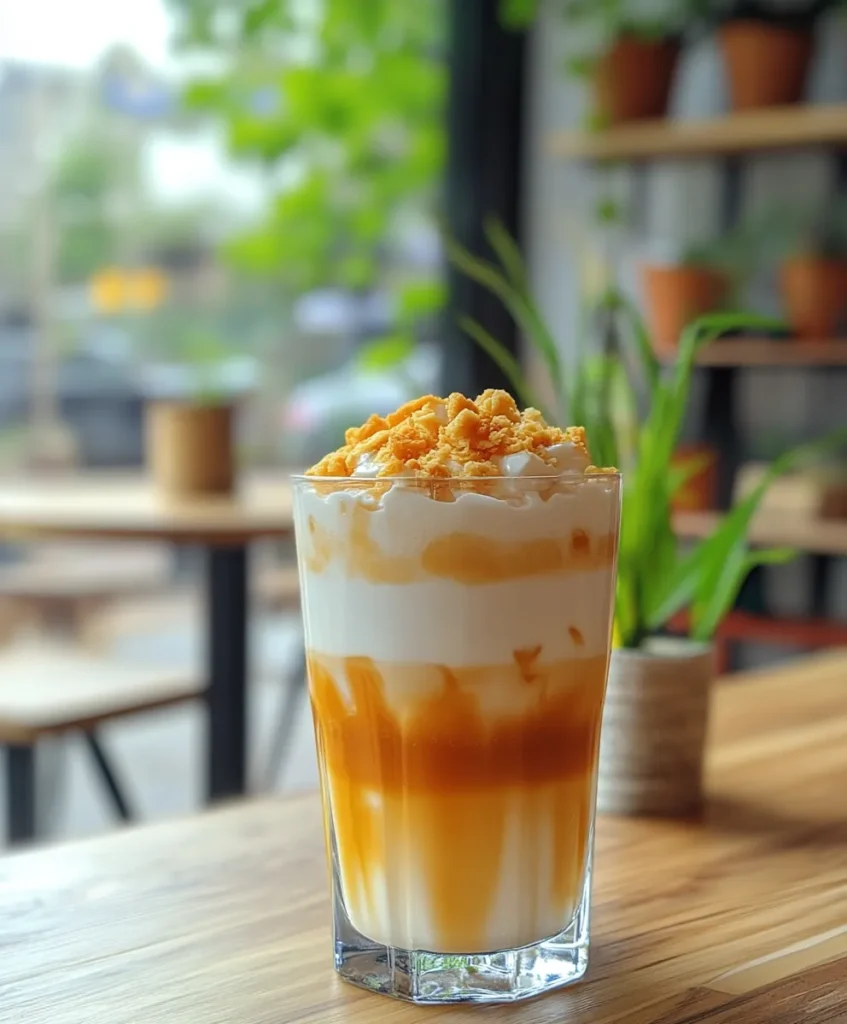
You don’t need dairy to get that creamy, dreamy texture.
Here’s how to make a completely plant-based version that still tastes just like the classic.
Ingredients:
- Thai tea base (same as the original)
- Sweetened condensed coconut milk (or homemade with coconut milk + sugar)
- Oat milk or almond milk (for topping)
Pro Tips:
- Coconut condensed milk adds richness and sweetness just like dairy.
- Use a creamy plant milk (oat or soy work best) for the finishing swirl.
And yes — still serve it over ice in a clear glass because that swirl moment? Still magical.
Thai Iced Tea with Boba (Bubble Tea Style)
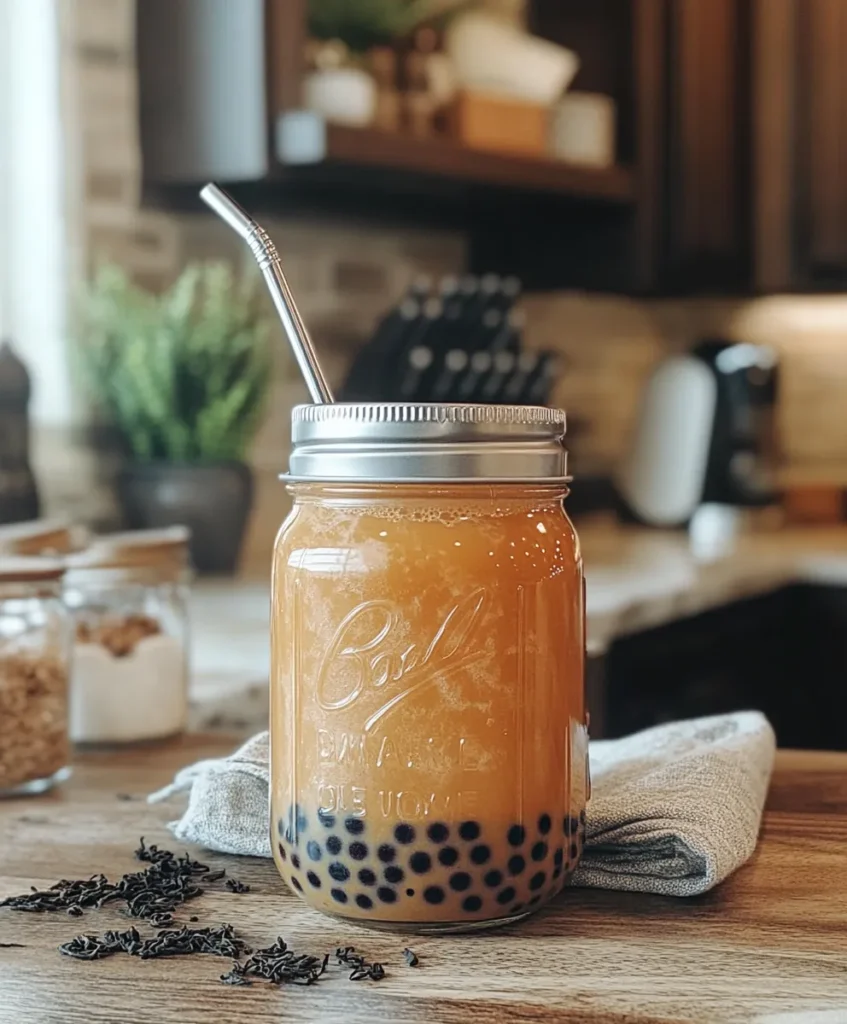
You’ve seen it. You’ve probably paid $6+ for it. Now let’s make it at home.
Here’s what you need:
- Classic Thai iced tea base (chilled)
- Cooked tapioca pearls (boba) – you can buy these at Asian markets or online
- Simple syrup (to sweeten the boba)
Steps:
- Cook boba per package directions and soak in simple syrup for at least 10 mins.
- Add about 1/4 cup of boba to your glass.
- Fill with ice, pour in your tea, then top with milk or condensed milk.
It’s basically Thai iced tea meets bubble tea — and yes, it’s ridiculously good.
If you’re into bold flavors, you’ll love this blackberry sage lemonade refresher — another chilled, homemade drink with a refreshing twist.
Thai Tea Latte (Hot Version)
This one’s for those cozy, rainy days when you want the comfort of Thai tea but not the chill of ice.
To make it hot:
- Brew your Thai tea as usual.
- Heat your milk or plant milk in a saucepan or frother.
- Sweeten with condensed milk or syrup.
- Pour into your favorite mug — foam on top optional, but highly recommended.
It’s rich, comforting, and a total game-changer if you thought Thai tea was only a summer drink.
💡 Bonus Ideas:
- Add a small splash of vanilla extract to enhance the flavor depth.
- Use maple syrup or agave instead of sugar for a more natural sweetener.
- For a grown-up version: try a small splash of bourbon or Thai rum (but keep it classy, and only for adults, of course).
Common Mistakes to Avoid
You’ve got the recipe, you’ve got the ingredients — but Thai iced tea has a few traps that can sneak up on you if you’re not careful.
Whether you’re brewing for the first time or just haven’t nailed that restaurant-level flavor yet, this section is going to set things straight.
Let’s talk about the things I definitely messed up when I started — so you don’t have to.
Don’t Over-Steep: Here’s Why
It’s easy to think “the longer I steep, the stronger the tea.” But Thai tea isn’t about bitter strength, it’s about bold but smooth flavor.
Over-steeping = harsh, tannic, and mouth-drying.
You don’t want that.
What to Do:
- Bring the water to a boil, then let the tea mix simmer gently for 3 to 5 minutes.
- After that, turn off the heat and let it steep (not cook) for another 10–15 minutes max.
- Always strain well — no one wants gritty tea dust at the bottom of their glass.
Balancing Sweetness: It’s All About Preference
Thai iced tea is naturally sweet, but “sweet” means different things to different people. Some recipes go heavy on condensed milk and sugar — and it ends up tasting more like dessert than a drink.
Fix it with balance:
- Start with 2–3 tablespoons of condensed milk per serving, then adjust to taste.
- Want to cut back on sugar? Use evaporated milk or oat milk for creaminess without the extra sweetness.
- Prefer it extra sweet like the restaurants? Add simple syrup or sweetened tea base.
Remember: It’s easier to add sweetness than take it away.
Storage Tips: How to Make It in Advance
Want to prep Thai tea for the week? Totally doable — but there’s a right way to do it so it doesn’t go stale or flat.
DO:
- Brew the tea base and store it in a glass container (not plastic) in the fridge.
- Use it within 3–4 days for best flavor.
- Store boba separately (if using) and prep fresh when serving.
DON’T:
- Don’t mix in milk before chilling — the dairy can curdle or separate.
- Don’t leave it uncovered — it can absorb fridge smells and lose its aroma.
💡 Pro Tip: Keep a small batch of sweetened condensed milk in a sealed jar so you can mix fresh glasses on the fly — no need to start from scratch every time.
Thai Iced Tea vs Other Teas
Ever wondered what really makes Thai iced tea different from chai, boba, or your classic Southern sweet tea?
You’re not the only one.
There’s a lot of confusion out there — especially when drinks look similar (milky, sweet, iced) but taste nothing alike. So let’s clear things up with a quick comparison, so your readers never mix them up again.
Thai Tea vs. Chai Tea
| Feature | Thai Iced Tea | Chai Tea |
|---|---|---|
| Origin | Thailand | India |
| Tea Base | Black tea (often flavored) | Black tea with spices (masala) |
| Flavor | Bold, slightly sweet, creamy, with vanilla notes | Warm, spiced (ginger, cloves, cardamom) |
| Sweetener | Sweetened condensed milk | Often sugar or honey |
| Milk Type | Condensed + evaporated or whole milk | Steamed milk (latte-style) |
✨ Bottom line: Chai is spiced and warming. Thai tea is bold, creamy, and sweet — no heavy spice. Totally different vibes.
Thai Iced Tea vs. Milk Tea (a.k.a. Bubble Tea)
| Feature | Thai Iced Tea | Milk Tea (Boba) |
|---|---|---|
| Color | Bright orange | Usually tan, brown, or beige |
| Flavor | Strong tea, creamy, slightly floral | Milder, sometimes flavored (taro, matcha, etc.) |
| Add-ons | Usually none (unless boba is added) | Commonly includes boba, jelly, pudding |
| Origin | Thailand | Taiwan |
Thai iced tea can be served with boba — but it’s not inherently a bubble tea. It’s more traditional, less dessert-like.
Thai Iced Tea vs. American Sweet Tea
| Feature | Thai Iced Tea | Southern Sweet Tea |
|---|---|---|
| Milk? | Yes | No |
| Sweetness | Rich & creamy | Syrupy but clear |
| Color | Orange | Deep brown or amber |
| Served With | Milk, sometimes spices | Lemon, mint, or plain |
American sweet tea is brewed strong and sweetened heavily with sugar — but it’s usually served without milk and has a totally different taste profile.
💡 So if you’ve ever had chai, milk tea, or sweet tea and assumed Thai iced tea would taste similar… now you know: it stands in a category all its own.
Best Thai Tea Brands & Where to Buy
Let’s be real: the brand of Thai tea you use matters. A lot.
Some mixes are strong and flavorful, others taste watered-down. Some are loaded with artificial coloring; others go the natural route.
So how do you pick the right one?
I’ve tried a bunch — and here’s the short list of my go-to brands and where to find them.
Best Loose Leaf and Pre-Mix Options
Whether you want that classic Thai restaurant flavor or something more natural and clean, these brands have you covered.
1. ChaTraMue (a.k.a. Number One Brand)
- Flavor: Bold, sweet, classic — this is the OG Thai brand used in most restaurants.
- Color: Bright orange (includes food coloring)
- Where to Buy: Amazon, Asian grocery stores, chatramue.com
If you’re after that iconic flavor and don’t mind the dye, this is the one.
2. Pantai Thai Tea Mix
- Flavor: Slightly lighter than ChaTraMue, but still authentic.
- Color: Orange (food dye included)
- Where to Buy: Amazon, H-Mart, Walmart (sometimes)
3. Wangderm Thai Tea Leaves (Loose Leaf)
- Flavor: Natural and robust, great for making your own mix.
- Color: No artificial coloring
- Where to Buy: Amazon, specialty tea sites
Great for those who want control over ingredients and a more authentic tea taste without additives.
4. Tea Drops Thai Tea Kit
- Flavor: Sweet, rich, and totally mess-free.
- Color: No dyes, eco-friendly format.
- Where to Buy: teadrops.com, Amazon
Best for convenience — just drop, stir, and sip.
Online Shops vs Local Asian Markets
So, should you order online or shop local? Here’s the breakdown.
| Source | Pros | Cons |
|---|---|---|
| Online (Amazon, brand sites) | Easy access to top-rated brands, reviews help guide you | May pay more for shipping or bundles |
| Asian Grocery Stores | Affordable, great for exploring new options | Limited brand selection or English labeling |
| Specialty Tea Stores | Good for loose leaf and dye-free options | Can be pricey or niche |
💡 Pro Tip: If you’re shopping in-store, check the ingredient label. Look for “black tea” as the first ingredient and scan for artificial dyes if you’re avoiding them.
So whether you’re shopping for that restaurant-style flavor, keeping it natural and clean, or want a DIY loose-leaf version, these brands will totally elevate your homemade Thai iced tea game.
How to Serve & What to Eat With Thai Iced Tea
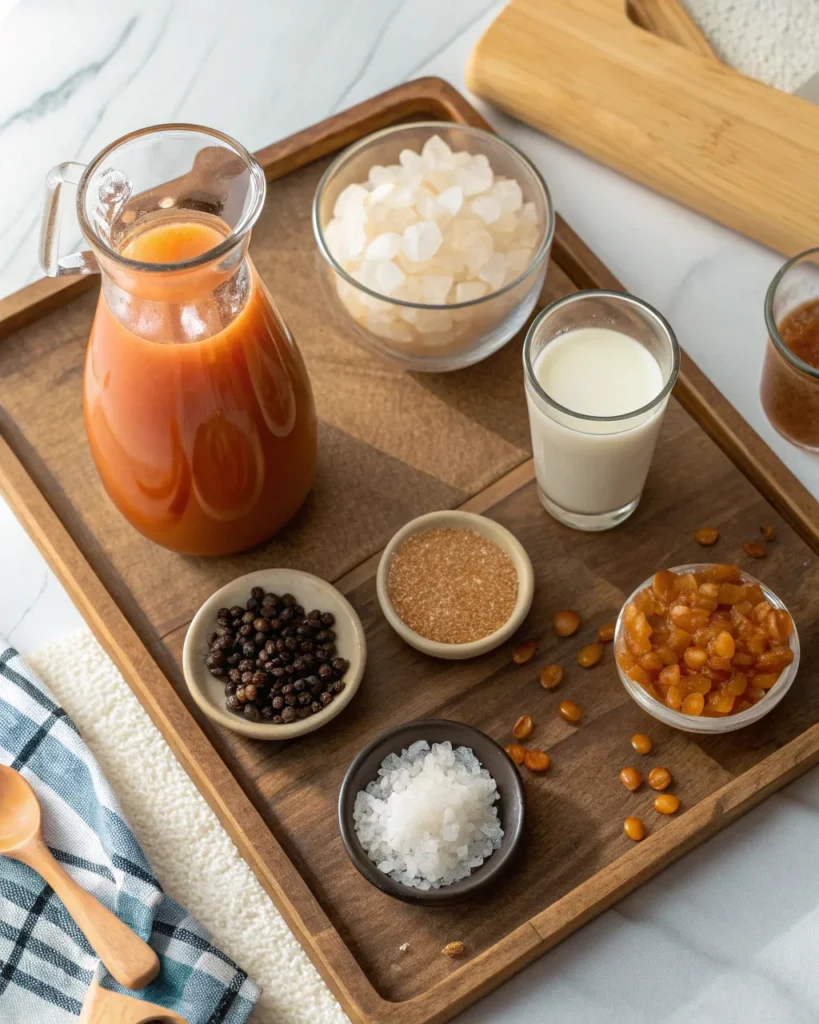
Let’s be honest — Thai iced tea is more than just a drink.
It’s a vibe. It’s colorful, creamy, and instantly elevates whatever else is on the table. So if you’re going to make it at home, don’t just throw it in a red solo cup and call it a day (unless that’s your thing — no judgment).
Here’s how to serve it right, pair it well, and even impress a crowd.
Pairings That Pop (Vegetarian-Friendly Only)
Since Thai iced tea is sweet and rich, it pairs best with salty, spicy, or crunchy foods.
Here are some epic combos to try:
| Food | Why It Works |
|---|---|
| Vegetarian Spring Rolls | Fresh and crisp — balances the creaminess |
| Pad Thai (tofu version) | Classic Thai main dish with sweet/savory flavor |
| Spicy Papaya Salad (Som Tum) | Cold + spicy + tangy = perfection with Thai tea |
| Mango Sticky Rice | Double dessert? Yes. And it works. |
| Fried Tofu Bites | Crunchy, neutral base that lets the tea shine |
💡 Sweet drink + salty snack = ultimate balance.
Presentation Tips for Parties or Brunch
Want to wow your guests with Thai iced tea that looks like it came from a cafe?
Here’s what to do:
- Use tall clear glasses – show off that dreamy orange-and-cream swirl.
- Serve over crushed ice – not just cold, but café-chic.
- Drizzle the milk slowly down the side for that marbled look.
- Garnish with a cinnamon stick or star anise pod if you’re feeling extra.
Hosting a brunch or afternoon get-together?
Set up a DIY Thai tea bar with:
- Tea concentrate in a pitcher
- Crushed ice in a bucket
- A selection of milks (evaporated, coconut, oat, etc.)
- Glass jars of boba, sweeteners, and garnishes
Let guests mix their own — they’ll love it.
Creative Thai-Inspired Drink Pairings
Making a Thai-inspired menu or drink board? Here are a few more options to add alongside your iced tea:
- Iced Lemongrass Ginger Tea – light, citrusy, and great with food
- Thai Basil Mojito (mocktail version) – bright and herbal
- Coconut Water with Lime – hydrating and refreshing
- Chilled Jasmine Green Tea – subtle and floral
Thai iced tea is the star, but these pairings round out the cast beautifully.
For something truly unique, try this pickle lemonade recipe — it’s surprisingly tasty alongside spicy Thai dishes.
Frequently Asked Questions About Thai Iced Tea
Is Thai iced tea caffeinated?
Yep — Thai iced tea does contain caffeine.
The base is black tea (usually Ceylon or Assam), which naturally has about 30–50 mg of caffeine per cup. It’s not as strong as a cup of coffee, but enough to give you a little boost. If you’re caffeine-sensitive, go easy or try a decaf black tea blend.
Can I make Thai iced tea without condensed milk?
Absolutely. If you’re avoiding dairy or just want something lighter, you can swap condensed milk with:
- Coconut condensed milk (vegan and just as sweet)
- Oat or almond creamer + a little maple syrup or simple syrup
- Evaporated oat milk for that café-style swirl
You’re still going to get that creamy, dreamy finish — just in a way that works for you.
Why is Thai iced tea orange?
That bright orange color comes from food coloring, which is added to most store-bought Thai tea mixes.
Brands like ChaTraMue and Pantai include yellow and red food dyes to get that signature color.
If you want a more natural version, you can skip the dye and go for:
- Loose black tea
- A pinch of turmeric or annatto for color
- All the flavor, without the artificial tint
Is Thai iced tea gluten-free?
Yes — Thai iced tea is naturally gluten-free, as long as the tea mix doesn’t contain any unexpected additives.
Just be sure to:
- Read labels if you’re using a pre-mixed blend
- Stick with loose leaf tea if you want total control over ingredients
If you’re sensitive or celiac, always double-check — but in general, it’s a safe bet.
Can I use almond milk or oat milk in Thai iced tea?
For sure! Both work great.
Almond milk gives a light, nutty flavor, while barista-style oat milk offers a super creamy texture that’s perfect for that Thai tea swirl.
Just remember to use unsweetened or lightly sweetened versions so your drink doesn’t get too sugary (especially if you’re still using condensed milk or syrup).
Is Thai iced tea too sweet?
It can be sweet, but that’s totally up to you.
Most restaurant versions are very sweet, but at home, you’re in control. Want it lighter? Use more tea and less condensed milk. Want it rich and dessert-like? Go full pour.
That’s the beauty of making it yourself — you decide how sweet is sweet enough.
Conclusion: Homemade Thai Iced Tea Is Simpler Than You Think
So there you have it — a full Thai iced tea guide that doesn’t just taste good, it feels good too.
You’ve got the authentic recipe, real ingredient insights, and enough variations to make it yours, whether you’re going dairy-free, going bold with boba, or keeping it classic.
Looking for something fruity and refreshing to go with it? Don’t miss our homemade mango smoothie recipe — it’s the perfect tropical pairing with Thai iced tea.
You don’t need to spend $7 on a café version anymore. You’ve got all the tools to create something just as delicious, maybe even better — because it’s made by you.
If you try it, let me know! I’d love to hear how it turns out and what twist you put on it.
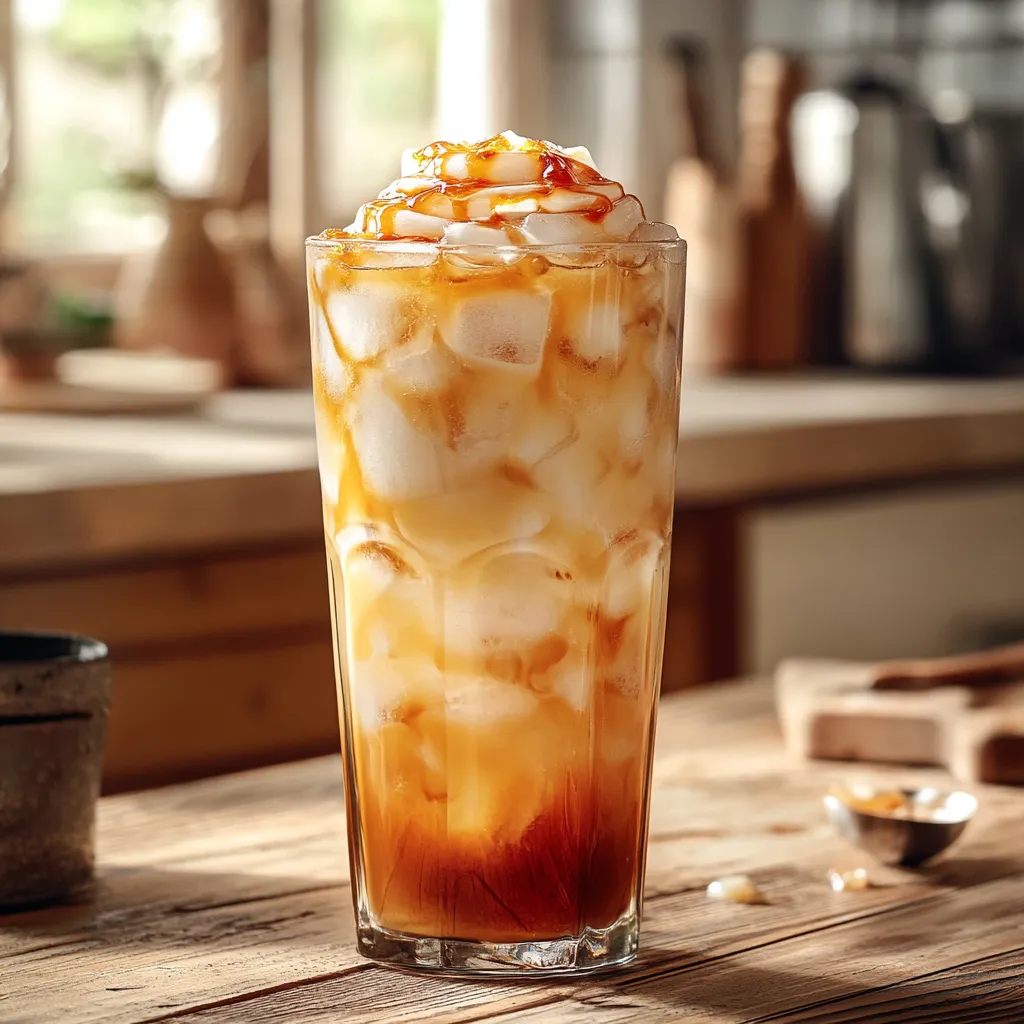
Authentic Thai Iced Tea (Better Than Takeout)
Ingredients
Equipment
Method
- Boil the water in a saucepan, then reduce to a simmer.
- Add Thai tea mix and simmer for 3–5 minutes.
- Remove from heat and let steep for 10–15 minutes. Then strain.
- Chill the tea in the fridge for 30–60 minutes.
- Fill a tall glass with ice, pour tea ¾ of the way full.
- Stir in sweetened condensed milk.
- Top with evaporated or oat milk. Serve and enjoy.
Notes
- For a vegan version, use coconut condensed milk and oat milk.
- You can prep the tea base in advance and store it in the fridge for up to 3 days.
- Skip food coloring for a natural amber look.


